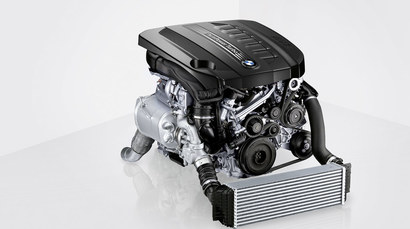
Variable Twin Turbo Diesel
Variable Twin Turbo technology takes the BMW four and straight six-cylinder diesel engines to unmatched levels of performance. It dual-stage design enables the engines to achieve performance figures that previously only larger eight-cylinder engines could reach. Emissions and fuel consumption, however, are impressively low.
Innovations such as common rail direct injection and exhaust gas turbo charging with variable turbine geometry have driven dramatic improvements in the performance of diesel engines.
The introduction of BMW's dual-stage turbocharging system, Variable Twin Turbo, represents another quantum leap in diesel engineering. This technology delivers a performance boost of 25 per cent, and enables instant responsiveness even at low engine speeds - as well as enormous reserves of power at higher revs.
The heart of the Variable Twin Turbo system comprises two turbochargers of different sizes. In contrast to the bi-turbo system, the two turbochargers do not operate parallel, but are activated at different points. Precisely coordinated, they run individually or together, increasing the pressure of the intake air to the optimum level. The greater pressure of the intake air enables a more effective combustion of the diesel fuel in the cylinder.
At lower engine speeds, the intake air passes through the inactive larger turbocharger into the active smaller turbocharger, which increases the air pressure. At medium engine speeds, the larger turbocharger becomes active, forcing air under pressure into the smaller unit, which increases the pressure still further. At higher engines speeds, the larger turbocharger alone forces air into the cylinders.
Despite these impressive dynamics, the fuel consumption of the Variable Twin Turbo diesel engine is exemplary low, according to EU standards. The standard diesel particle filter ensures that strict EU4 emissions standards are met.
Back to list
Innovations such as common rail direct injection and exhaust gas turbo charging with variable turbine geometry have driven dramatic improvements in the performance of diesel engines.
The introduction of BMW's dual-stage turbocharging system, Variable Twin Turbo, represents another quantum leap in diesel engineering. This technology delivers a performance boost of 25 per cent, and enables instant responsiveness even at low engine speeds - as well as enormous reserves of power at higher revs.
The heart of the Variable Twin Turbo system comprises two turbochargers of different sizes. In contrast to the bi-turbo system, the two turbochargers do not operate parallel, but are activated at different points. Precisely coordinated, they run individually or together, increasing the pressure of the intake air to the optimum level. The greater pressure of the intake air enables a more effective combustion of the diesel fuel in the cylinder.
At lower engine speeds, the intake air passes through the inactive larger turbocharger into the active smaller turbocharger, which increases the air pressure. At medium engine speeds, the larger turbocharger becomes active, forcing air under pressure into the smaller unit, which increases the pressure still further. At higher engines speeds, the larger turbocharger alone forces air into the cylinders.
Despite these impressive dynamics, the fuel consumption of the Variable Twin Turbo diesel engine is exemplary low, according to EU standards. The standard diesel particle filter ensures that strict EU4 emissions standards are met.